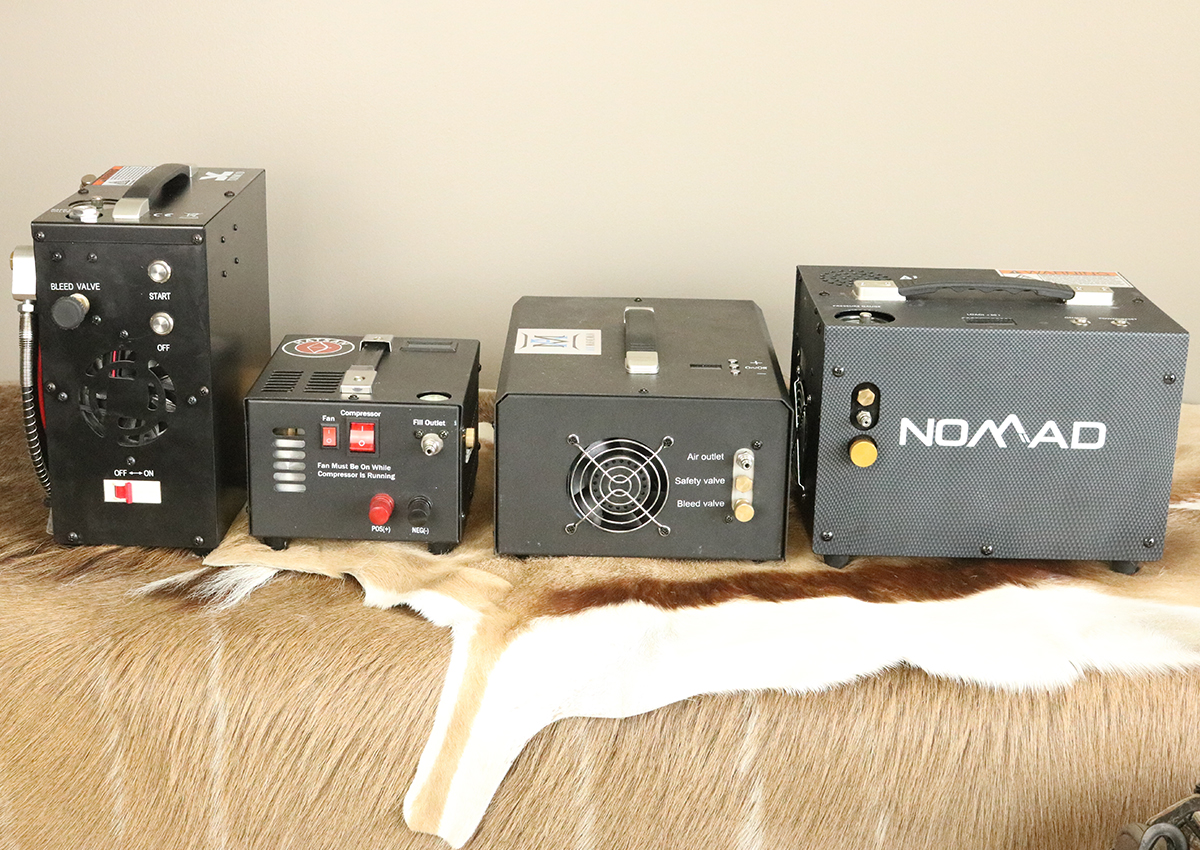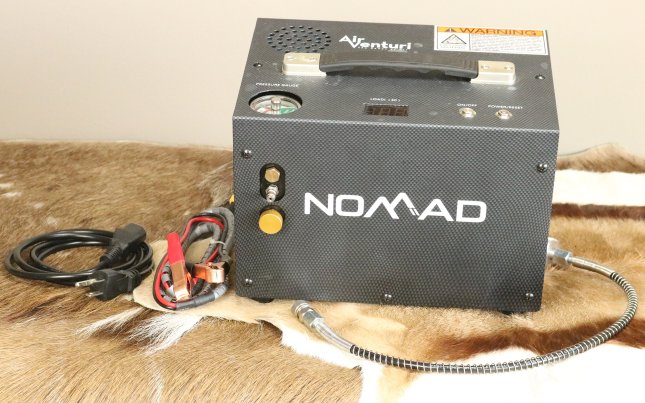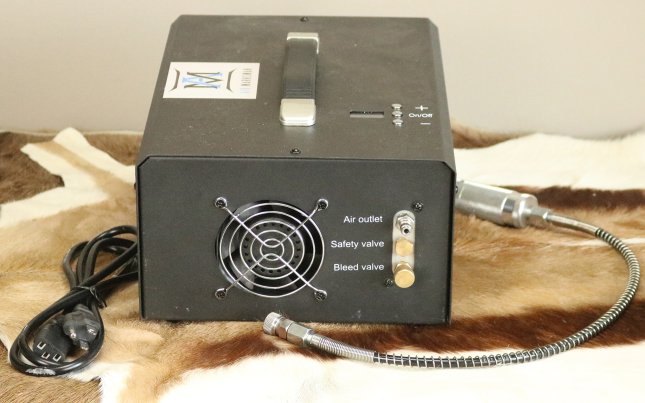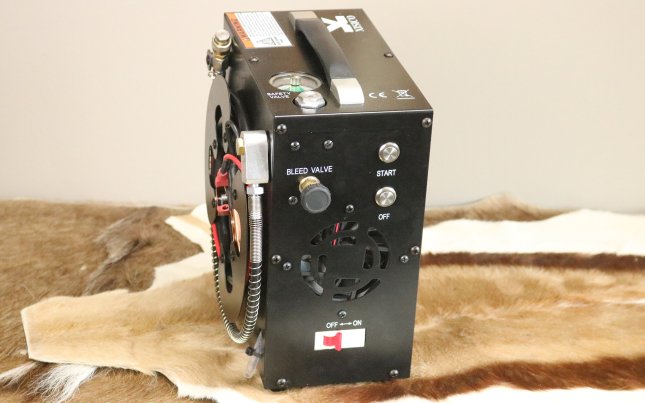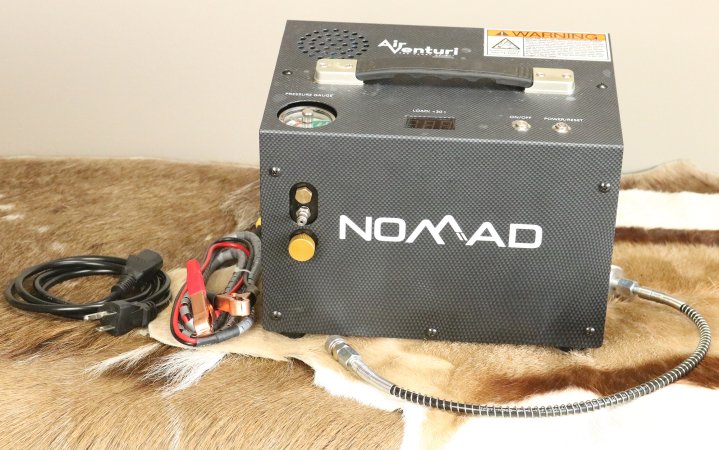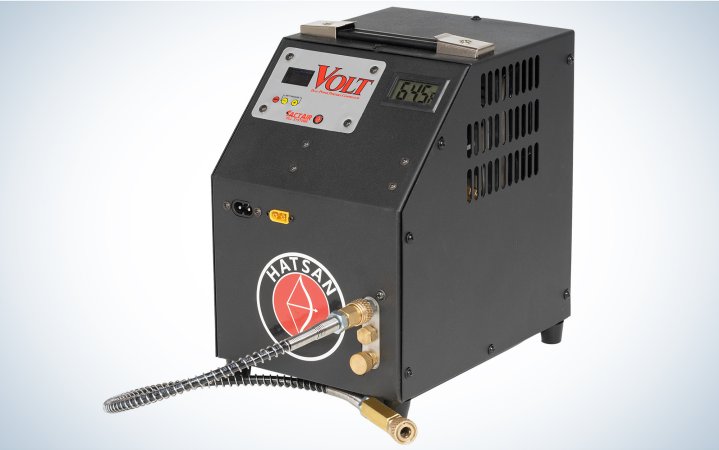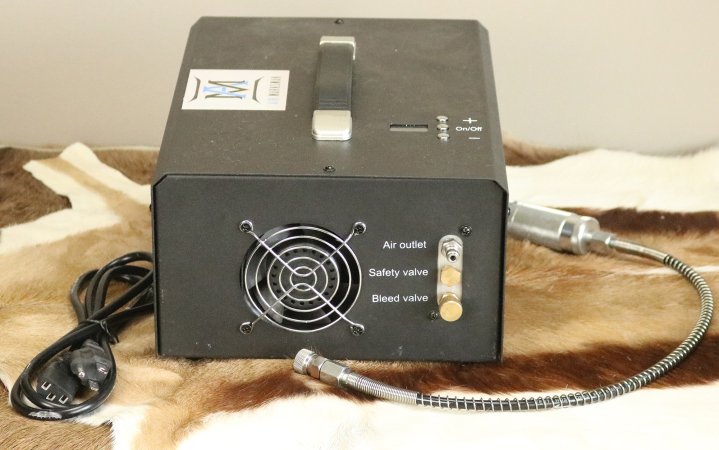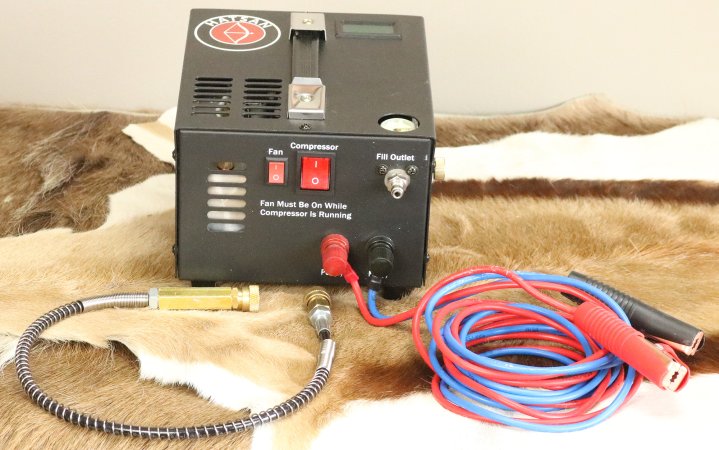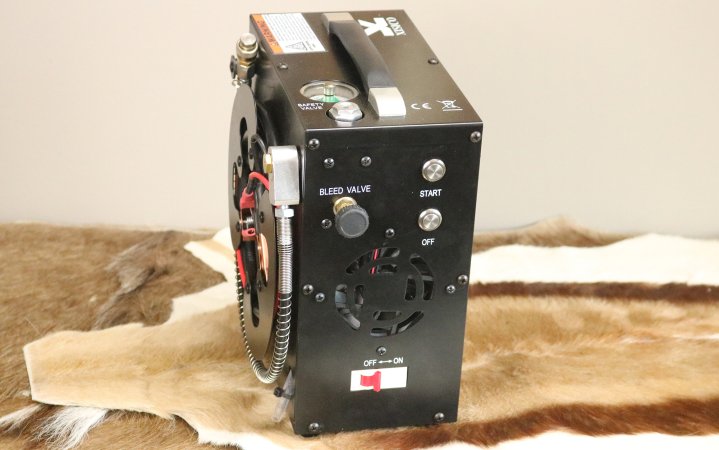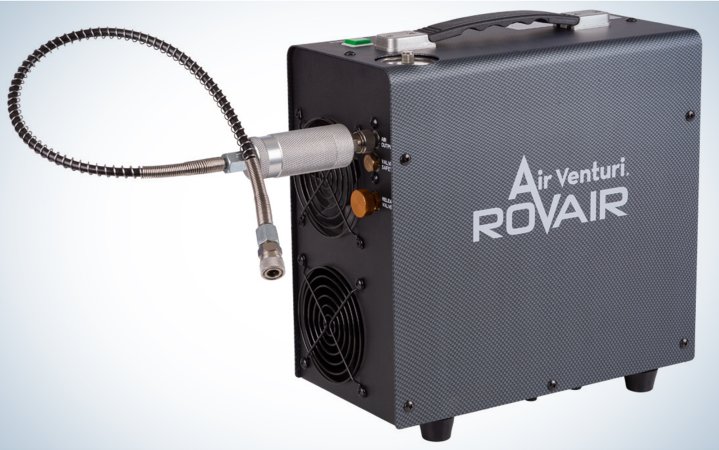We may earn revenue from the products available on this page and participate in affiliate programs. Learn More ›
Pre-charged pneumatic (PCP) air rifles offer excellent accuracy and power, but to utilize the latest in air rifle technology, you need a way to fill the rifle’s air tank. A standard bike pump or tire air compressor won’t cut it. You need a specialized compressor that will attain around 3,000 psi.
These compressors range in size from portable to full sized power houses. To help you find the best PCP air rifle compressor for your needs, I tested compressors by putting them through the wringer while hunting and testing air rifles.
- Most Versatile: Air Venturi NOMAD III
- Most Versatile Portable Compressor: Hatsan TactAir Volt Portable
- Quickest Fill: AirMarksman
- Most Compact: Hatsan TactAir Spark
- Quietest: JTS COMP1 Portable PCP Compressor
- Best Value: AirVenturi ROVAIR 4500 Portable Compressor
How I Chose the Best PCP Air Rifle Compressors
In the early 2000s, I started hunting extensively with precharged pneumatic airguns. I’ve taken big game in every state where airguns are legal and conducted the first sanctioned big game airgun hunts in South Africa, returning for seven airgunning safaris since. I continue to travel throughout the USA and abroad to hunt with airguns.
I’ve used all of the devices on the list extensively, and make these recommendations based on real world experience.
Best Air Rifle Compressors: Reviews & Recommendations
Most Versatile: Air Venturi NOMAD III Portable Compressor
Pros
- Easy to use
- Excellent performance and high-pressure fill capabilities
- Runs on several power sources without requiring an adaptor
Cons
- Most expensive at $799
- Larger dimensions
Key Features
- Max Fill Pressures: 4500 psi
- Power Source: AC at 110V or 220V, DC 12 V (No adaptor required)
- Rapid Fill Rate: 0 to 3,000 psi in 6 minutes
- Auto shut-off, preset for desired pressure.
- Air cooled
- Dimensions: 10.6 x 8 x 7.9 inches
- Weight: 19.6 pounds
I have been using the Nomad II for several years now, and it has been a reliable workhorse that has routinely filled everything from small tube reservoirs to larger integrated bottles at pressures over 4000 psi. The new Nomad III improves on the Nomad II and makes a great compressor even better.

The ability to run this compressor off AC power at the ranch house or off my 12v truck battery in the field, without an external power adaptor, is very convenient. The user interface is easy to read and set with analog pressure gauges and pressure shut offs, the controls are conveniently laid out, tactile, and easy to manipulate.

This is a versatile option for PCP airgunners allowing them to fill up at the range or in the field. The Nomad II has built in LED lighting on the bottom of the unit that facilitates use in low light settings. Whether filling a PCP airgun from empty or just topping off, this compact compressor fills quickly and efficiently. The Nomad III is capable of filling a 250cc cylinder from 0 psi to 3000 psi in as little as 9 minutes. The adjustable, automatic shut-off allows you to set the compressor to the exact fill pressure of your gun (up to 4500 psi) and the unit stops when that pressure is reached.
Most Versatile Portable Compressor: TactAir Volt Portable
Pros
- Can fill gun directly or a small tank
- Easy to use interface
- Fills quickly
Cons
- Medium expensive at $499
- Larger dimensions
Key Features
- Max Fill Pressures: 4500 psi
- Power Source: AC at 110V or 220V, DC 12 V (No adaptor required)
- Includes microbore fill hose with inline moisture filter
- Auto shut-off, preset for desired pressure
- Air Cooled: automatic cooling fans
- Dimensions: 10.6 x 8 x 7.9 inches
- Weight: 15 pounds
The reasons I like this compressor are multifaceted; the system runs fairly quietly (which is relative when discussing small compressors), the user interface is intuitive and easy to work with, and the fill rate is good. I appreciate the integrated moister filter and additional filters shipped with the unit. But what really appeals to me is that this is one of the only portable compressors rated not only for direct filling of guns, but for small carbon fiber tanks as well.
Hatsan specifies that the Volt can be used for filling up to 1-liter tanks (about 61 cubic inches), which is a standard paintball tank. This means that you can charge your gun, fill a small buddy bottle, and be good for a few days of hunting. I think to get the full benefit of this compressor, you’ll probably want to add a small carbon fiber tank at some point, though that is certainly not a requirement. I will say that this compressor does an excellent job of keeping even the more air hungry and high pressure driven big bore rifles I shoot fully filled and ready for action.
Quickest Fill: Airmarksman
Pros
- Charges high pressure guns quickly
- Easy to use interface
- Moderate price point at $500
- Built in power source
Cons
- Some may prefer analog controls
- Moderate noise level
Key Features
- Max Fill Pressure: 4500 psi
- Power Source: Built-in AC 110v, DC 12v
- Digital interface
- Air cooled
- Weight: 17 pounds
- Dimensions: 12 x 15 x 10 inches
I have been using the Airmarksman portable compressor for over two years now, and it has provided a reliable and trouble-free source of air to feed my lineup of hunting rifles from the standard calibers on up to the big bores. While I haven’t done a formal quantitative test, based on my experience, this compressor charges the most powerful air rifles faster than any other in my lineup.
The Airmarksman is a compact compressor running off both AC and DC power sources that are designed to fill an air rifle directly. Connect the rifle, charge it up, and go shooting. This compressor also features a simple and easy to use interface for a quick setup. The Airmarksman can fill guns to a maximum pressure of 4500 psi, with an auto shutdown to power down once the desired pressure is reached, which means you don’t have to monitor the gun as it fills.
Read Next: Can Air Rifles Effectively Kill Big Game? In Short, Yes
Most Compact: Hatsan TactAir Spark
Pros
- Smallest and most compact
- Easy to deploy
- Easy to use
- Lowest price point: $419, but often found below $400
Cons
- Noisy and vibrates
- AC requires external power source
- Slowest fill (Slightly)
Key Features
- Max Fill Pressure: 4500 psi
- Power Source: DC 12V
- Microbore fill hose
- Air cooled
- Dimensions: 5.5 x 5.25 x 6.5 inches
- Weight: 13 pounds
I use a hybrid approach to keeping my rifles charged on long hunting excursions. I’ll fill a couple tanks from my industrial compressor before leaving home to quickly fill guns in the field. But I also carry a portable compressor to top off my guns as the external tanks pressure drops, or as insurance in case I run out of air. The Hatsan TactAir Spark is so small and compact that it stays permanently stored in the cargo area of my vehicle, always ready when needed. This device has saved more hunts for me than any other device I’ve used, because it can be easily packed away and is always available.
The Hatsan TactAir Spark is a dual power (with an external AC power module) compact compressor that can be directly connected to a PCP air rifle to quickly charge it up to a pressure of 4500 psi. Measuring in at 5.5 x 5.25 x 6.5 inches, this handy little compressor provides big performance in a small package. The interface is easy to use and features an automatic shutoff so guns can be filled without being monitored.
Quietest: JTS COMP1 Portable PCP Compressor
Pros
- Excellent performance
- Operates quietly
- Solid value
Cons
- Requires AC power module
- No quick release for air hose
- A moderately large frame
Key Features
- Max Fill Pressure: 4500 psi
- Power Source: AC 110v, 220v (with an external power adaptor) and DC 12v
- Integrated hose management system
- Auto shut-off
- Moisture filter
- Dimensions: 10.5 x 5.5 x 5.5 inches
- Weight: 20 pounds
Xisico is an established manufacturer which has long supplied guns and components on an OEM basis to the airgunning industry. But at the SHOT Show they were introducing their new US based company, JTS, and its branded products. One that caught my eye was their GX-E-CS3 compact compressor, which has been on the market under various labels for a while and has garnered a solid user base. I was anxious to give this compressor a try and ordered one soon after returning home. This attractively priced and feature rich platform has performed well for me over the last few months, but what really stood out was how quiet this device was. The mechanical noise is low, and there is minimal movement when in operation.
The GTX compressor can fill a PCP airgun directly using the included 110V to 12V converter, or directly from a 12V DC source. It will fill most PCP airguns in 5-12 minutes, with an even quicker turn-around on top-offs. This product is not a replacement for larger compressors designed to fill large volume tanks being smaller, slower, and not designed to run for more than 15-minute intervals.
Best Value: AirVenturi ROVAIR 4500 Portable Compressor
Pros
- Virtually any power source can be used
- Easy to use interface
- Quiet and very fast fill rate (for direct rifle fill)
- Low maintenance requirement
Cons
- Not rated to fill tanks
- No carrying case
- Fill hose is short
Key Features
- Max Fill Pressures: 4500 psi
- Power Source: AC at 110V /220V / 12V Battery
- Dual fan, air cooled
- Auto shut-off, preset for desired pressure.
- Weight: 18 pounds
The Nomad Portable Compressor has been the primary workhorse in the Air Venturi line for a few years now and has been my go-to compressor in the field. I have covered literally thousands of miles with this compressor, charged many rifles ranging from standard caliber small game guns up to my big game/big bore rifles, and it has never failed me, The only downside is the price at almost $700.
Air Venturi has slipped an intermediate compressor into the line up with the RovAir 4500 PSI Portable PCP Compressor. It is a reliable and compact compressor that offers fill times on par with the Nomad III and up to 25 percent faster than the Nomad II. It has a reduced price but provides the same dependable performance that field shooters need and expect. The fill times achieved by this model are impressive, and almost any high-pressure rifle can be filled in 5-15 minutes depending on onboard reservoir size and specified fill pressures (much quicker for top-offs).
Another much appreciated characteristic is that the RovAir does not require constant maintenance and oil refills as did many earlier compressors. The Air Venturi RovAir is an excellent solution for filling PCP guns in the field because it can be used on a 12V automotive battery for portable operation, but then can be plugged into a wall socket when you return home. I believe that when all is considered, the RovAir might be the best all around value in a portable compressor today.
Read Next: Best Air Rifles
Things to Consider Before Buying the Best PCP Air Rifle Compressor
Filling Frequency
PCP Air Rifles have integrated air storage, such as a reservoir tube or a bottle at the forestock or butt, which will hold enough air for multiple shots. How many shots depends on several variables: the capacity of the tank, fill pressure, projectiles used, power output of the gun, and efficiency of air flow through the gun to name a few. Typically, standard caliber guns will store enough air for 25 to 150 shots per fill, while big bores generally provide far fewer shots per fill, in the three to ten shot range.
If you find yourself refilling frequently, you might need to power your compressor in the field. Some of the compressors on this list have flexible power sources and some are built-in, but you can also use portable power stations that have 120v plugs to keep your compressor running.

Types of Air Supply
To keep the gun filled to the appropriate volume and pressures, air must be supplied through an external source. There are a few options: hand pumps, tanks, or compressors. There are pros and cons to each, and after a quick look at these we’ll take a look at a few of my favorite solutions.
Hand Pumps
hand pumps used to fill PCP air rifles look like a bicycle tire pump on steroids. They are larger and made of much heavier materials to stand up to the high pressures, but work along the same lines. However, while a bike tire requires a small volume of air at pressures usually well under 130 psi, PCP airguns have a larger air reservoir and need pressures of at least 1500 psi to over 4000 psi. Moving this volume of air to these pressures requires a great deal of effort.
The advantages of hand pumps are that they tend to be the least expensive method, are fully self-contained, and are effective—though not easy. And that’s the major con; these pumps require the user to lay their full body weight into each stroke of the pump, and to do so over a couple hundred pumps. If the individual doing the pumping is of smaller stature, this becomes very difficult if not impossible. And if they are heavier, I hope it’s muscle because you are in for a workout.
Tanks
The next option is an air tank, which depending on the pressures you need to fill your gun, could be either an aluminum scuba tank or a high-pressure, carbon fiber tank. These external tanks will hold a large volume of compressed air that is then used to refill the gun and will usually provide several refills before it needs to be refilled. The tank is then brought to a facility with a compressor such as a dive shop, paintball shop, or sometimes a fire station, to be refilled. This is the method I used for many years. I had three carbon fiber tanks (I do a lot of shooting) that I would bring to the local paintball shop, and they could refill my tanks to 3800 psi and would charge me $5 per tank.
Whether using scuba or carbon fiber tanks, the cons are that tanks are considerably more expensive than a hand pump and have an ongoing cost to refill them. You need to find a place to refill them as well, and many dive shops and to a lesser degree paintball shops, are limited in the pressures they can provide. And lastly, every few years you need to bring your tanks in for testing and certification. However, on the pro side, once you have a place to refill tanks, they are very easy, portable, and fast to use.
Full-Size Compressors
The holy grail for most airgunners would be their own compressor, which could then be used to fill scuba or carbon fiber tanks whenever required. The paintball shops I was using to fill my tanks had limited hours of operation and a limit on the pressure to which they could fill these tanks. I not only had many guns to fill, but also several that filled to pressures exceeding the limits imposed at these refill stations, so getting a compressor was a game change for me. A couple times a month, I could collect all my external tanks and refill them, and then have air on tap whenever it was needed.
The problem was costs. A compressor at that time could easily cost $2,000 to $4,000, and since they were large and only ran on an AC power source, still required tanks to recharge in the field. The price has come down somewhat on the full-sized compressors designed for refilling high pressure large volume carbon fiber tanks. There are now options for quality compressors at around $1,300 to $4,000, but you’ll probably still need an external air tank for refills in the field which adds several hundred dollars to the bill. These compressors tend to be large, loud, and can be mechanically complex to operate and service, though this is also improving with newer models. On the pro side, you have a never-ending supply of air, and over time the costs are averaged down.
Compact Compressors
More recently another alternative has become available, and that is the compact compressor designed to fill the smaller air reservoirs on the gun directly, negating the need for an intermediate air tank. These compressors are characterized by their small footprint, low weight, ability to run on AC or DC power, and simplicity of operation. Continuing the pros, the costs for these devices tend to be attractive, typically in the $400 to $800 range.
On the con side of the proposition, these compressors cannot be used to fill large volume external tanks, they can be loud, and they take longer to refill the gun than when filling from a carbon fiber tank. Probably the biggest advantage is that the compact compressor frees the airgunner from reliance on a third party to keep their guns running and is probably the most cost-effective approach aside from the hand pump. Considering all of the advantages these devices provide, I believe that for many shooters they provide an ideal solution.
Final Thoughts on the Best PCP Air Rifle Compressors
The method you select to keep your guns filled depends on several factors. I would not recommend a hand pump if you do a lot of shooting, unless you really enjoy a workout and need to economize on your equipment budget. Tanks are a very good option if you have a fill station, paintball shop, dive shop, or fire department that is both willing and able to fill tanks for you. Or if you have your own high-volume compressor and can fill tanks whenever needed. However, this type of compressor can be quite expensive, and you could expect to pay at least $1500, and very possibly much more.
The recent advent of portable compressors has provided another option that offers many advantages to the airgunner. While not a solution for filling large volume external tanks, these devices do an excellent job of filling individual guns. It takes longer to fill a gun from a portable compressor than an external tank, but it is still fairly quick, and an order of magnitude quicker than a hand pump. I believe that depending on your individual requirements, any one of these portable compressors addresses the airgunners ongoing need to keep their rifles supplied with air.
- Most Versatile: Air Venturi NOMAD III
- Most Versatile Portable Compressor: TactAir Volt Portable
- Quickest Fill: AirMarksman
- Most Compact: Hatsan TactAir Spark
- Quietest: JTS COMP1 Portable PCP Compressor
- Best Value: AirVenturi ROVAIR 4500 Portable Compressor
